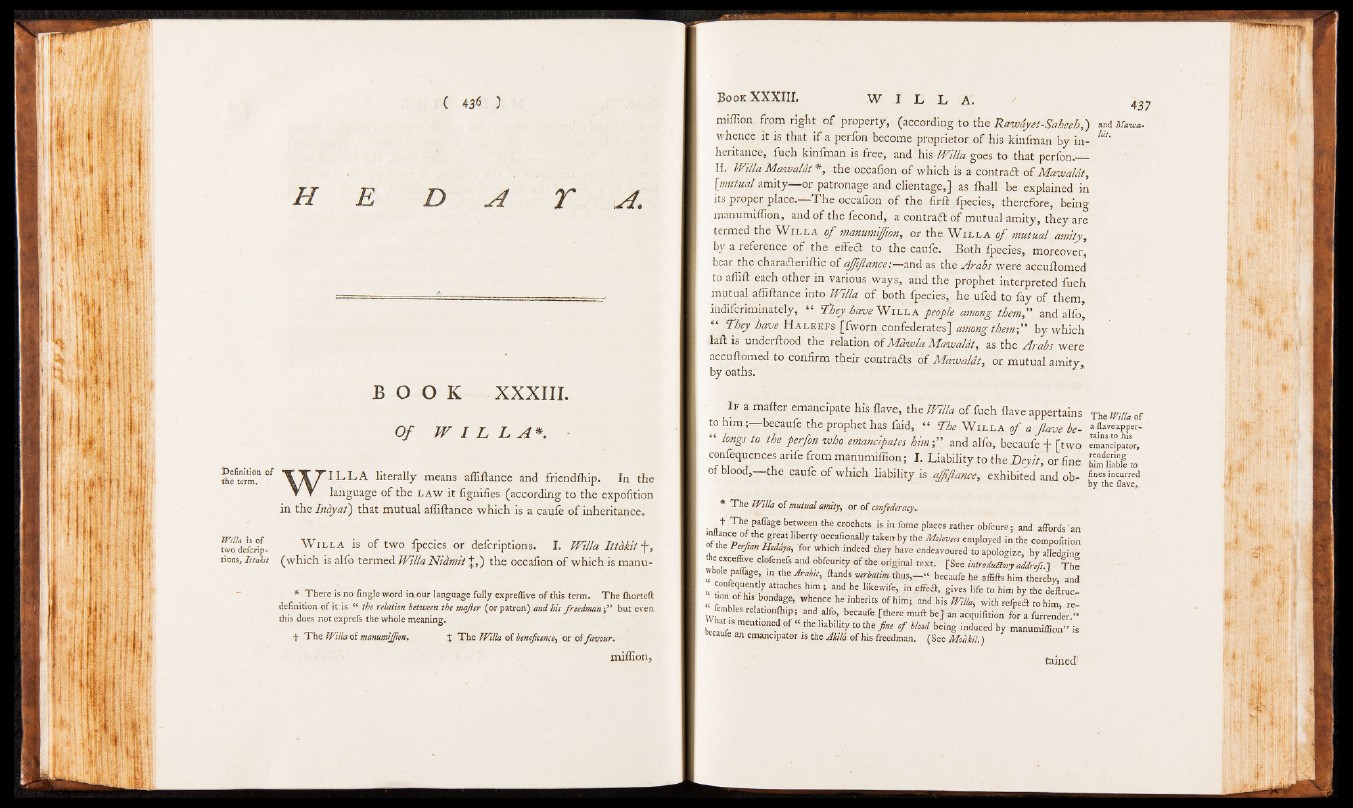
Definition o f
the term.
W illa is o f
two defcrip-
tions, Ittakit
H E D A T A.
B O O K XXXIII.
Of W I L L A * . -
WI L L A literally means affiftance and friendfhip. In the
language of the l aw it fignifies (according to the expofition
in the Inbyai) that mutual affiftance which is a caufe of inheritance.
W i l l a is of two fpecies or defcriptions. I. Willa Ittakit
(which is alfo termed Willa Nidmit J ,) the occafion of which is manu-
* T h e re is no fingle word in our language fully expreffive o f this term. T h e fhorteft
definition o f it is « the relation between the mafter (or patron) and his f r e e d m a n but even
this does not exprefs the whole meaning.
+ T h e W illa o f manunuJfion% % T h e W illa o f beneficence> or o f fa v o u r.
million,
million from right of property, (according to the Rawdyet-Saheeh,)
whence it is that i f a perfon become proprietor of his kinfman by inheritance,
fuch kinfman is free, and his Willa goes to that perfon._
II. Willa Mawalat *, the occalion of which is a contraft of Mawaldt,
[mutual amity— or patronage and clientage,] as ihall be explained in
improper place.— 1The occafion of the firft fpecies, therefore, being
manumiffion, and of the fecond, a contract o f mutual amity, they are
termed the W il l a o f manumiffion, or the W il l a o f mutual amity,
by a reference of the effect to the caufe. Both fpecies, moreover’
bear the charafteriftic of affiflance:—and as the drabs were accuftomed
to affift each other in various ways, and the prophet interpreted fuch
mutual affiftance into Willa of both fpecies,; ,he ufed to fay of them,
indiferiminately, “ They have W il l a people among them;' and alfo’
“ They have Haleefs [fworn confederates] among them\' by which
laft is underftood the relation of Mawla Mawaldt, as the drabs were
accuftomed to confirm their contracts of Mawaldt, or mutual amity,
by oaths.
If a mafter emancipate his Have, thzW illa of fuch Have appertains
to him;—becaufe the prophet has faid, “ The W il l a o f a Jlave be-
“ longs to the perfon who emancipates h im " and alfo, becaufe f [two
confequences arife from manumiffion; I. Liability to the Deyit, or fine
of blood,—the caufe of which liabilityis, afftffance, exhibited and ob-
* T h e W illa o f mutual amity, or o f confederacy.
• » + T h ' P * % e b e tw e e t l* e crochets is in fome places rather obfeure; and affords'an
8 1 M l f f M liberty oceafionally taken b y the Molauees employed in the competition
of the Perfian Hedaya, for which indeed they have endeavoured to apologize, by alledging
e exceffive clofenefs and obfeunty o f the- original text. [See introductory addrefsA T h f
whole pafTage ,n the A rabu, Hands verbatim, th u s ,.- « becaufe he affiftshim thereb and
« “ nft<l uently attaches h im ; and: he likewife , in e ffe S , gives life to him by the deftruc-
„ " onkOf his bondage, whence he inherits o f him; and his W illa , with re fp e a to him, re -
embles relationfhip; and alfo, becaufe [there muft be]-an acquifition for a furrender ”
What ,s mentioned o f « the liability to the fin e o f blood being induced b y manumiffion” is
oecaute an emancipator is the d k ili o f his freedman. (See M oaU l.)
and Mawaldt,
T h e W illa o f
a Have appertains
to his
emancipator,
rendering
him liable to
fines incurred
by the Have,.
tained